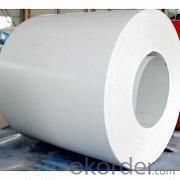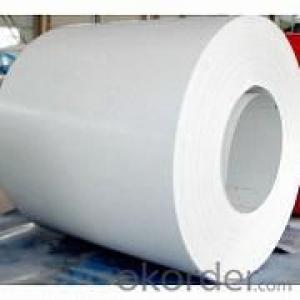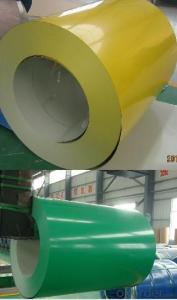Prepainted steel coils Hot sale white color
- Loading Port:
- Shanghai
- Payment Terms:
- TT OR LC
- Min Order Qty:
- 50 m.t.
- Supply Capability:
- 10000 m.t./month
OKorder Service Pledge
OKorder Financial Service
You Might Also Like
Quick Details
| Standard: | AISI,ASTM,DIN,JIS | Grade: | steel | Thickness: | 0.17-1.5mm |
| Place of Origin: | China (Mainland) | Brand Name: | CNBM | Model Number: | SGCC Q195L, Q235, DX51D |
| Type: | Steel Coil | Technique: | Hot Rolled,hot dip | Surface Treatment: | Coated |
| Application: | Flange Plate | Special Use: | Steel | Width: | 600-1250mm |
| Length: | 2000-6000mm |

Our Advantages
1. more than 10 years experiences in steel business
2. good quality
3. competitive price
4. meet your needs via reprocessing
5. excellent service
6. short delivery time
7. long mutual beneficial business cooperation
8. certificate: ISO9001
| Commodity | Prepanited steel coil |
| Grade | JIS G3302(SGCC), DX51D, EN10142, GB/T2518-2004, ASTM 653 |
| Standard | ASTM, AISI, DIN, GB |
| Types | Commercial / Drawing / Deep Drawing / Structural quality |
| Width | 500/650/726/820/914/1000/1200/1219/1220/1250mm |
| Thickness | 0.16-1.2mm (0.14-0.5mm is the most advantage thickness) |
| Type of coating | Galvanized |
| Zinc / PE coating | Z60-275g/m2 ,12-20μm(top)/7-10μm(bottom) |
| Surface | RAL System as per customers request |
| ID coil | 508mm |
| Coil weight | 4-6MT |
| Package | Properly packed for ocean freight exportation |
| Application | Industrial panels, roofing and siding for painting |
| Payment terms | 30%TT in advance+70% TT or irrevocable 100%L/C at sight |
| Delivery time | 25 days after recepit of 30% TT or L/C |
PACKING
4 eye bands and 4 circumferential bands in steel, galvanized metal fluted rings on inner and outer edges, galvanized metal & waterproof paper wall protection disk, galvanized metal & waterproof paper around circumference and bore protection
FAQ
We have organized several common questions for our clients,may help you sincerely:
1)How to guarantee the quality of the products?
We have established the international advanced quality management system,every link from raw material to final product we have strict quality test;We resolutely put an end to unqualified products flowing into the market. At the same time, we will provide necessary follow-up service assurance.
2)How long can we receive the product after purchase?
In the purchase of product within 20-25 days, we will arrange the factory delivery as soon as possible. The pacific time of receiving is related to the state and position of customers. Commonly 15 to 30 days can be served.
3)Do you have necessary certificate or inspection to make sure we can import smoothly?
Syringes are CE,FDA approved. And we supplied main nations in the world.
- Q:What are the different types of steel coil packaging machines?
- There are several different types of steel coil packaging machines available in the market. These machines are designed to efficiently and effectively package steel coils for storage, transportation, or distribution. Some of the different types of steel coil packaging machines include: 1. Automatic steel coil packaging machine: This type of machine is fully automated and can handle high-volume packaging requirements. It uses advanced technology to wrap the steel coils with a protective layer of film or paper. The machine can also apply strapping or stretch film to secure the coils during transportation. 2. Semi-automatic steel coil packaging machine: This machine requires some manual intervention to load and unload the steel coils. It is suitable for medium to high-volume packaging needs and offers a good balance between automation and cost-effectiveness. The machine typically uses a combination of wrapping, strapping, and shrinking techniques to package the coils. 3. Vertical steel coil packaging machine: This type of machine is designed specifically for packaging vertical steel coils. It can wrap the coils with a layer of film or paper, and then apply strapping or stretch film to secure them. The vertical design allows for easy loading and unloading of the coils. 4. Horizontal steel coil packaging machine: This machine is ideal for packaging horizontal steel coils. It can wrap the coils with a protective layer of film or paper, and then apply strapping or stretch film to secure them. The horizontal design ensures easy loading and unloading of the coils. 5. Customized steel coil packaging machine: Some manufacturers offer customized packaging solutions based on specific requirements. These machines can be tailored to accommodate different coil sizes, shapes, and packaging materials. They are designed to provide maximum flexibility and efficiency in the packaging process. In summary, the different types of steel coil packaging machines include automatic, semi-automatic, vertical, horizontal, and customized machines. The choice of machine depends on factors such as packaging volume, coil orientation, and specific requirements of the steel coils being packaged.
- Q:What are the different types of corrosion protection methods used for steel coils?
- There are several types of corrosion protection methods used for steel coils, including: 1. Coating: Applying a protective layer of paint or coating, such as epoxy or zinc, on the surface of the steel coil to prevent direct contact with moisture and corrosive substances. 2. Galvanization: Immersing the steel coil in a bath of molten zinc to create a protective zinc coating, which acts as a sacrificial layer that corrodes first before the steel. 3. VCI (Volatile Corrosion Inhibitors): Using volatile chemicals that release protective vapors, which form a thin layer on the steel coil's surface, inhibiting corrosion by blocking moisture and oxygen. 4. Passivation: Treating the steel coil with chemicals like nitric acid to remove impurities, creating a passive oxide layer that protects against corrosion. 5. Cathodic Protection: Connecting the steel coil to a sacrificial anode (usually made of zinc or magnesium) or using impressed current to provide a flow of electrons, which prevents corrosion by making the steel coil the cathode in an electrochemical cell. 6. Environmental Control: Maintaining controlled temperature, humidity, and atmospheric conditions during storage and transportation to minimize exposure to corrosive elements. These methods can be used individually or in combination, depending on the specific requirements and environmental conditions.
- Q:What are the common methods of testing the strength of steel coils?
- Some common methods of testing the strength of steel coils include tensile testing, hardness testing, and bend testing. Tensile testing involves applying a pulling force to the coil until it breaks, measuring the maximum force it can withstand. Hardness testing determines the steel's resistance to indentation or scratching, providing an indication of its strength. Bend testing involves bending the coil to a specific angle and examining if it fractures or shows signs of deformation.
- Q:i have a computer chair where the metal part that attachs the top part to the bottom with wheels has cracked around half of the assembly. my dad said it might be able to be repaired with jb weld. can jb weld fix it? how strong is jb weld? is it as strong as steel?
- ...
- Q:What are the typical dimensions of a steel coil?
- The typical dimensions of a steel coil can vary depending on its specific application and industry. However, common dimensions for steel coils include a width ranging from 0.5 inches to 72 inches, and a thickness ranging from 0.010 inches to 0.625 inches. The inner diameter of the coil is usually between 16 inches and 24 inches, while the outer diameter can range from 48 inches to 72 inches.
- Q:I looking at replacing a few of the panels on my car with either Carbon Fiber or High Tensile Steel to shave off some weight and increase mpg and take some time off my quarter mile. Which is better: Carbon Fiber or High Tensile Steel?
- In terms of strength/weight ratio then carbon fiber is excellent. However in terms of strength/cost then steels is better. With strength/weight then you save money in the long run (less fuel usage) but with strength/cost ratio you save money immediately when the car is made. So it's a complex tradeoff that has to do with your time-value of money.
- Q:How are steel coils processed and shaped for specific applications?
- Steel coils are processed and shaped for specific applications through a series of manufacturing processes. These processes typically include cleaning, pickling, cold rolling, annealing, and slitting. Cleaning removes any surface impurities, pickling removes scale and oxides, cold rolling reduces the thickness and enhances the strength, annealing improves ductility and reduces hardness, and finally, slitting cuts the coils into desired widths. These steps ensure that steel coils are transformed into the appropriate shape and size required for specific applications, such as in construction, automotive, or manufacturing industries.
- Q:What are the different coil packaging options available for steel coils?
- There are several different coil packaging options available for steel coils, depending on the specific requirements and preferences of the customers. Some of the commonly used packaging options include: 1. Steel Strapping: This is a traditional method of packaging steel coils, where a high-tensile steel strap is used to secure the coil. It provides excellent stability and protection during transportation and storage. 2. Plastic Strapping: Plastic strapping is a more cost-effective and lightweight alternative to steel strapping. It is commonly used for smaller and lighter steel coils, providing adequate strength and protection. 3. Shrink Wrapping: Shrink wrapping involves covering the steel coil with a plastic film and then applying heat to shrink and tightly seal the film around the coil. This packaging method offers protection against moisture, dust, and other contaminants. 4. Wooden Crates: Steel coils can also be packaged in wooden crates, which provide additional protection against physical damage during handling and transportation. Wooden crates can be customized to fit the specific dimensions of the coil and can be easily secured with straps or nails. 5. Coil Covers: Coil covers are large, heavy-duty plastic or fabric covers that are placed over the steel coil to protect it from environmental factors such as UV exposure, moisture, and dust. They are often used in combination with other packaging methods for added protection. 6. Paper or Fiberboard Wrapping: This packaging option involves wrapping the steel coil with paper or fiberboard material. It provides a lightweight and cost-effective solution for protecting the coil against minor scratches and abrasions. 7. Customized Packaging: Depending on the specific requirements of the customer, steel coils can be packaged using a combination of the above options or customized packaging solutions. This may include additional padding, corner protectors, or special handling instructions to ensure the safe transportation and storage of the coils. It is important for customers to consider factors such as coil size, weight, transportation mode, storage conditions, and budget when choosing the most suitable coil packaging option for their specific needs.
- Q:What are the different methods of testing the mechanical properties of steel coils?
- There are several methods for testing the mechanical properties of steel coils. Some commonly used methods include tensile testing, hardness testing, impact testing, and bend testing. Tensile testing measures the strength and ductility of the steel by applying a tensile force until it breaks. Hardness testing determines the resistance of the steel to indentation or scratching. Impact testing measures the ability of the steel to withstand sudden forces or shocks. Bend testing evaluates the flexibility and resistance to cracking of the steel by bending it to a specific angle. These methods help assess the quality and performance of steel coils in various applications.
- Q:what do we use steel for and whyand why do we use brass for instrumentsplz help its homework and i cant find the answer anywhere : (
- By instruments do you mean musical instruments? Brass is used for musical instruments because it's strong but very malleable. It's easy to hammer and roll into sheets, or form into tubes and complex shapes. It's easy to work with using hand tools. It's also very corrosion resistant and polishes very well. It has an attractive gold-like color. It also has some effect on sound, though the shape and design of an instrument is much more important to the sound than the material that's used. Apart from musical instruments, brass is used for items that need to be both durable, easy to manufacture, and resistant to the elements. For example plumbing items like valves and screw couplings.brass is a lot easier to cut with machine tools than steel. It's also traditionally used for hardware on doors and cabinets because of it's color, low friction properties, and corrosion resistance. Brass also is toxic to bacteria, and so brass doorknobs disinfect themselves after about 9 hours. Steel is very strong and very cheap. Steel is basically iron with a small amount of carbon added which makes it much stronger. Iron is the fourth most common element in the earth's crust, after oxygen, silicon, and aluminum. Brass being a mixture (an alloy) of copper and zinc, with other metals sometimes added. Copper and zinc are the 27'th and 26'th most common elements. Therefore, it make sense that brass is much more expensive than steel. Steel is used for too many things to be listed. The use of steel technology has impacts on almost every aspect of modern life. Nearly all of the man-made objects you touch on a regular basis were made using steel tools and steel machinery.
1. Manufacturer Overview |
|
|---|---|
| Location | |
| Year Established | |
| Annual Output Value | |
| Main Markets | |
| Company Certifications | |
2. Manufacturer Certificates |
|
|---|---|
| a) Certification Name | |
| Range | |
| Reference | |
| Validity Period | |
3. Manufacturer Capability |
|
|---|---|
| a)Trade Capacity | |
| Nearest Port | |
| Export Percentage | |
| No.of Employees in Trade Department | |
| Language Spoken: | |
| b)Factory Information | |
| Factory Size: | |
| No. of Production Lines | |
| Contract Manufacturing | |
| Product Price Range | |
Send your message to us
Prepainted steel coils Hot sale white color
- Loading Port:
- Shanghai
- Payment Terms:
- TT OR LC
- Min Order Qty:
- 50 m.t.
- Supply Capability:
- 10000 m.t./month
OKorder Service Pledge
OKorder Financial Service
Similar products
New products
Hot products
Hot Searches
Related keywords





























